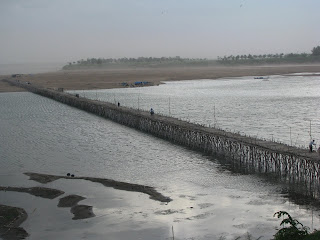The Mirror, Vol. 13, No. 613
The Mirror has frequently focused on problems related to law and order – including, of course, the rights of citizens guaranteed by the Constitution, which the organs of law enforcement should protect and not curtail.
Very often problems in society do not happen because of a lack of legal clarity, but because existing laws are not enforced. Stability and happiness in a society depend, however, on predictability and general contentment, based on the notion that laws will be enforced to establish justice in peace.
In every society there are people who break the law – that is why all societies and states have developed rules how to deal with such violations of the rules. Most societies work with the concept that individuals do not have the right to break the rules or to use violence that harm others – but the state has a monopoly to enforce laws, and it is assumed that this happens regularly, as a matter of fact.
Why is it that in Cambodia, law enforcement often does not happen just simply based on an existing law, but an additional appeal or even a threat is necessary.
In 2007, traffic accidents killed 1,545 people in Cambodia. In 2008, 1,638 people lost their lives on the roads. During the first four months of 2009, already 579 people were killed on the roads. If this trend continues, the death toll by the end of the year may be more than 1,700.
There are many reasons that contribute to this tragedy, and many different measures to work against it.
A couple of years ago a rule was established that motorcycles have to have rear-view mirrors, and after a period of preparation – ? – a campaign was held for some weeks, educating drivers without such mirrors. In 2007, a new Land Traffic Law was adopted, that drivers of motorcycles have to wear helmets. The police was authorized to fine drivers in violation with Riel 3,000 [approx. US$0.75] for no helmet, and Riel 4,000 [approx. US$1.-] for no side mirrors.
But the chief of the traffic police in Phnom Penh was recently quoted as saying that fining those who do not respect the law does not seem to be very effective – a surprising statement, when one sees regularly groups of police standing at the roadside and not intervening when traffic is stagnant or congested.
Now we had a headline, saying: “Head of the Government Orders Not to Charge Money from Those Who Do Not Wear a Helmet, but to Confiscate Their Motorbikes – the Owners Cannot Take Their Motorbike Back Unless They Go with Their Newly-Bought Helmet.“ The Phnom Penh Post had more to report from the Prime Minister’s speech: “Police must keep the motorbikes, and when the owners have helmets and side mirrors, they can get their motorbikes back, and I will grant the owners one liter of petrol as an encouragement for them.”
Is change to come? This is difficult to predict, considering a report in the Phnom Penh Post:
“The general director of the General Transportation Department at the Transport Ministry, said that the ministry would re-examine existing traffic legislation to identify the articles that needed to be amended.
We think that it will take a long time to amend this law because we have to check all the articles that are being enforced before sending it to the National Assembly.”
Will change come from new, detailed legislation, or form a new approach to the enforcement of existing law? To reform road traffic, starting from a weak sector seems anyway to be an “easy way out” – one would have expected also a word about the many private luxury cars without any number plate at all, or the heavy ones with with military or police plates, driving high speed on the wrong side of the road, with headlights on, indicating that “Now get out of my way, don’t you see who is coming!”
But there is some hope.
The Prime Minister gave also also an ultimatum of two weeks to the many owners of cars with military or police number plates, who are actually using the license plates illegally for their private vehicles. Several hundred cars have been re-registered in the meantime. It can be assumed that most of the owners and drivers of these cars, mostly middle and high ranking officials, knew well that they were acting illegally until now.
These are the first steps on a long and arduous way towards a deep re-orientation of values. How complicated the related mental attitudes are, became obvious when a journalist, taking a picture of a banner announcing the advice of the Prime Minister – not to charge a monetary fine from those who do not wear a helmet, but to temporarily confiscate their motorbikes – was detained for some time, until he could convince those who had detained him, that the press law allows it that one takes a picture on a public road.
Otherwise it's a thoroughly entertaining article.


